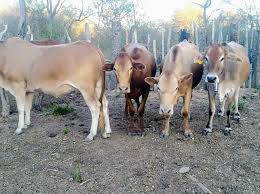Some farmers have expressed concerns that the recent rainfall will exacerbate the drought situation.
They fear the available grass will rot and have urged fellow farmers to destock and sell their steers.
This issue was discussed during the recent Farmers’ Great Indaba held in Bulawayo, which focused on survival strategies during the drought.
Topics at the Indaba included sustainable stock feed solutions, collaborations on grazing for small livestock, and other drought mitigation strategies.
Although some areas have received heavy rains, Deputy President of the Brahman Breeders Society of Zimbabwe, Mcebisi Ndlovu, warned that these rains are similar to those typically received around November.
He cautioned that this type of rain can cause the grass to rot, worsening the current drought situation.
“These rains cause the little grass to rot, thereby exacerbating the situation further,” he said.
Ndlovu emphasised the need for farmers to start selling their cattle immediately. He warned that waiting could result in significant financial losses due to decreased cattle weight and escalating prices for beef and stock feed.
“If you are still holding steers on your farm right now, let me tell you what’s going to happen,” he said. “You are waiting for the crisis to improve, but it’s not going to get better. It’s going to get worse. As the drought continues, the price of beef might increase to around US$1.20 because there’s a lot of destocking happening now. Very soon, there will be a shortage, and the price of beef will rise to about US$1.50. At the same time, those steers would have lost a considerable amount of weight, and that weight loss is money lost.”
“When you sell cattle, you are selling weight,” Ndlovu continued. “The period we are in is when cattle will lose weight. So, you have to sell your heifers now. You have to scale down. Don’t act as if it’s normal.”
He added, “It’s time to sell now. The MD of Agro-fields predicts that in two months, stock feed will hit US$400 mark. Now it’s around US$320. Stock feed is going to be expensive because everything associated with its production is going to be scarce. Those selling the inputs know they won’t be able to get them where they normally do anymore. This increasing demand will push prices up.”
Livestock specialist and columnist Mhlupheki Dube echoed concerns about the scarcity of stock feed, especially with the prioritization of maize for food security.
“The President’s declaration spoke about food security and people who are food insecure,” Dube said. “It’s only natural that the prioritisation in terms of feed would go towards mealie meal. We know that maize is the major component of stock feed. If we didn’t produce enough maize and have a poor stash of it, the capacity of our manufacturers here will be limited. You then begin to find stock feed scarce, and the prices go through the roof.”
He noted the unique challenges of this year’s drought, including water scarcity and inadequate grazing areas.
“Other than crop failure, you have water scarcity, which becomes a problem because of the drought,” Dube said. “As I speak, in the area where I keep my animals, we have three dams. Two of those dams never had any significant inflows. The major dam we rely on is at least projected to last until the end of May. After May going forward, it becomes a serious problem.”
Dube said grazing areas are also becoming a challenge.
“When you receive enough rain, your grass will grow,” he said. “But this time, because of the poor amount of rain, we didn’t have enough growth of grass. If the grass doesn’t grow, it means it will deplete within a few months. As I speak, some of the farmers here can attest that some of the paddocks are almost cleared out because the grass did not establish enough due to poor rains.”
He added that tree leaves will soon run out as livestock will become browsers surviving on mopane leaves and cacti.
“You will see your animals beginning to feed on less traditional feeds,” Dube said. “By traditional feeds, I mean things like your cactus (Idorofiya). If you have cactus, please guard it jealously. It can save your animals. It’s succulent, which means it can provide water and nutrients. You will find your animals, even those that tended to ignore the cactus, will feed on it. In difficult times, they will feed on iskusha (thorn bushes). So, as a farmer, you will have to look at unusual sources of feed to save your animals.”
Dube called on the government to provide relief grazing in national estates with idle land.

